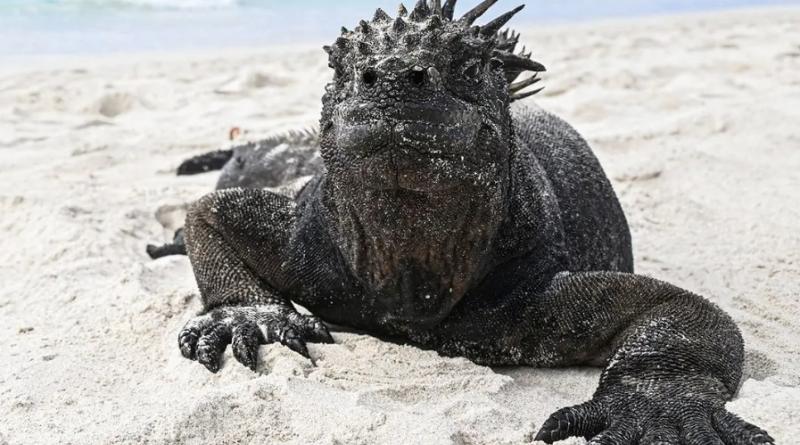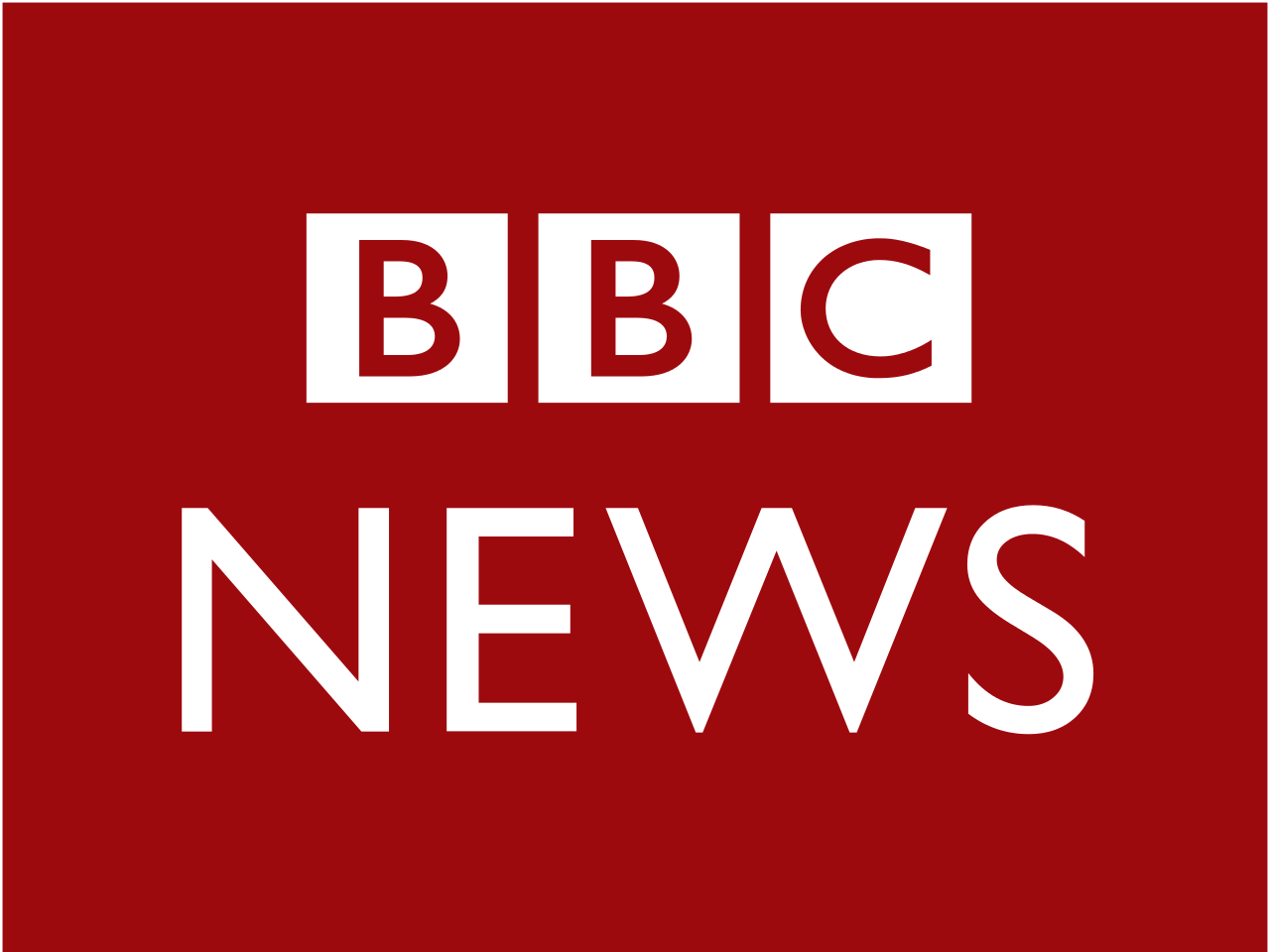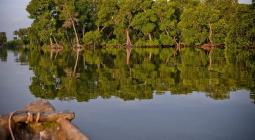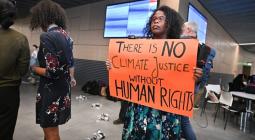What if debt was written off to protect climate and nature?

H
Hundreds of miles off the coast of South America lie the rocky, volcanic islands of the Galapagos. Teeming with unusual creatures – from jaunty, blue-footed birds to dragon-like iguanas – these bountiful isles have long inspired innovative thinking.
A visit by the 19th-Century naturalist Charles Darwin prompted his famous theory of evolution, which proposed that species that are more adapted to their surroundings are more likely to survive. And now the islands are playing host to a very contemporary adaptation experiment: debt relief in exchange for spending on climate and nature.
Earlier this year, Ecuador, which has sovereignty over the Galapagos, announced a record-setting deal. With the help of the private Credit-Suisse investment bank and the US development bank, it refinanced $1.6bn (£1.3bn) of government bonds at a discounted rate and issued a new "blue bond". In exchange, at least $12m (£10m) a year of the money saved via this cheaper loan will now be funnelled into conservation efforts in the remote archipelago.
Known as debt-for-nature or debt-for-climate swaps, these new financial tools are gaining ground in among severely indebted countries, from Barbados to Belize. Plus, in freeing money to restore ecosystems and build resilience, some believe they are shaping up to be part of the answer to a wider question: how to fund the world's climate change response?
Closing the climate funding gap
According to the Organisation for Economic Cooperation and Development (OECD), developing economies will need an annual $2.4 trillion (£1.9tn) of investment in climate action in the coming years. But wealthier nations have so far been slow to deliver on financial pledges to help poorer nations adapt to a hotter world. The new "loss and damage" fund announced at this year's COP28 launched with $400m (£318m) from rich nations. But developing nations stand to lose 1,000 times that much each year to climate change, by one estimate.
This money could fund projects that bolster natural defences, such as restoring mangroves to help protect against floods, or reforming agriculture to improve food system resilience.
Yet many nations are also not in a position to finance the above shifts. Loans can help – and in 2020 71% of public climate finance was provided this way – but last year more than 50 developing countries were already in severe debt. Some nations are currently paying their creditors more than 12 times what they spend on climate measures.
Much of today's economic vulnerability is also being caused by exogeneous shocks, not by poor macro management, explains Vera Songwe, co-chair of UN's independent high level group on climate finance. From Covid-19 to the war in Ukraine, to climate disasters, recent global events have slowed economic growth and pushed up interest rates. The result is that many poorer nations' debt burdens are skyrocketing, through no fault of their own. "We can't fix the climate issue unless we fix the debt issue," as the president of Kenya recently summed it up.
One way for indebted nations to respond to debt crises is by boosting exports of primary resources like fuel, forests or fish – but keeping these assets intact is now key to capturing carbon and saving biodiversity. Equally, debt can't be fixed without climate action either, for when climate-linked disasters strike, economies are further strained. Twenty-eight of the most severely indebted nations are already among the most climate-vulnerable.
Urgent debt relief is thus needed "to avert a deepening development crisis," the UN Development Programme (UNDP) has warned.
Bonding with nature
In the midst of these combined nature, climate and cost of living crises, are debt swaps for poorer nations the answer?
In 2015, the Seychelles wrote off almost $22m (£16.8m) of its debt in exchange for creating 13 new marine protected areas where fishing, oil exploration and other development is either banned or severely restricted. Belize, in 2021, was about to default on half a billion dollars, but it similarly shrank its debt by creating a blue bond to steer the savings into a fund for conservation. And in Portugal this year, the government pledged to reinvest the $650m (£524m) it is owed by Cape Verde back into the archipelago's green transition. (Read more about the deal that saved the Seychelles' troubled waters).
One advantage of such "swaps" is that they don't undermine a nation's credit rating, which would make it more expensive for them to borrow in the long-term. That might happen if debt was entirely written-off, says Andrew Deutz, managing director of global policy and conservation finance at The Nature Conservancy, an international conservation organisation has helped to roll-out a number of the schemes in Belize, Gabon and Barbados.
Deutz explains that by partially guaranteeing new, cheaper loans, nations' more expensive creditors can be paid off and the savings put towards marine protection. This may be "a pretty weird thing for an NGO" to do, he admits, as they are not a bank and their balance sheet is limited, but they're hoping to build a coalition that can "accelerate" and build from their proof-of-concepts.
Plus, there are early suggestions that the concept is helping conservation. The Belize deal has already led to an expansion of its ocean protection zone and the designation of public lands as mangrove reserves, according to an inaugural impact report. Meanwhile, in the Seychelles, where the new conservation effort has been in place for longer, 400,000 sq km (154,000 sq miles) of sea is now protected and blue whales have made a return.
Among the first beneficiaries of Belize's new fund is MarAlliance, a non-profit founded by marine conservation scientist Rachel Graham. The $327,000 (£260,000) that they've been awarded for three years will help restore the Gladden Spit and the Silk Cayes marine reserve. These stretches of ocean are home to unusually large populations of spawning finfish, and used to be a feeding hotspot for visiting whale-sharks. More than 20 years ago, Graham's research was instrumental in getting the area declared a special reserve, which helped replace unsustainable local fishing jobs with tourism opportunities. Since then, however, management has lapsed and poaching has increased – to the point where sharks are barely sighted anymore.
"We're going to assess the status of the spawning aggregations and study why the sharks aren't coming," Graham says. "Should we expand the protected area to help meet local and national conservation goals? Can we help support the local NGO in community engagement, managing the site and enforcing the protections? And how is climate change impacting habitats and fish stocks? These are some of the questions we are tackling."
The new funding should help find answers to these challenges. But there are also drawbacks to the mechanism as it currently stands, Graham stresses. Overburdensome reporting requirements hold up work and limit the type of organisation that can apply for grants, with smaller non-profits unable to afford the extra administrative costs. "We've run out of time: we have to implement the solutions now."
Cancelling injustice
Not everyone thinks such debt-swaps are a good approach, however. Administrative concerns aside, wider questions still remain about their impact.
We've run out of time: we have to implement the solutions now – Rachel Graham
The deals can have high transaction costs and are not on their own enough answer a nation's debt problems, warns Jayati Ghosh, professor of economics at the University of Massachusetts Amherst, in the US. The amount of debt relief the country gets is marginal, there is no adequate monitoring of the nature-benefits that will accrue, and the money is nowhere near enough to allow a country to deal with loss and damage costs, or even proper climate mitigation, she says.
But Deutz points out they can do some things other interventions so far have not. "As a conservation or climate finance mechanism, these debt-for-nature swaps are actually extraordinarily efficient delivery mechanisms compared with existing alternatives in the marketplace."
Alternatively, another option is to cancel a significant part of the debts outright. In 1950s Germany, Ghosh notes, creditors hoped to avoid a return to Nazism by wiping out half the nation's debt and transformed the other half into soft loans – which have low interest rates and no debt payment required if the country had a trade deficit.
And today, some campaigners argue debts should be cancelled in countries that need it, with assistance provided in the forms of grants not loans. More than 500 economists, climate experts and activists recently signed an open letter calling for action to this effect.
"Eliminating climate debt is essential for acknowledging the uneven burden of climate change on overexploited nations, which have the least contribution to global emissions," says Anuna De Wever, a climate activist who was prominent in Belgium's school strikes for climate. "We will not stand a chance against the climate crisis if we don't tackle the grave inequality that continues to exist through colonial legacies."
But cancelling a nation's debt outright is complicated by the diversity of creditors that now exist. Plus, for those that can avoid it, default or debt cancellation is not the preferred option, warns Songwe. "Many African countries worked hard to improve their macro performance and obtain market access; they do not want to lose that" she says. Cancellation may be "useful and important" for some nations that are really struggling, but not for all.
Cooperation not competition
Instead, a wider menu of reforms could all play a role in helping making debt more affordable and bolstering climate finance at the same time.
The Bridgetown Initiative, co-launched by the Prime Minister of Barbados Mia Mottley in 2022, has recently become a touchstone for calls to modernise the current global financial system. Its suggested reforms include automatic pauses in debt repayments if climate disaster strikes, extending the length of loans, reducing their costs, and setting up a facility to help if exchange rates change.
Multilateral institutions like the World Bank and International Monetary Fund (IMF) can lend at cheaper rates than capital markets. And as Mottley reminded world leaders at this year's global financial summit in Paris, they were established "to help the world in the reconstruction effort after World War Two. We are in a moment that is equal to World War Two with respect to climate."
The Paris summit did not result in any major reform, but the presidents of Kenya and France, alongside a host of major philanthropic foundations and NGOs, have signalled their support for the Bridgetown Initiative. Plus a raft of coalitions and institutions, including a UN advisory board, are now making similar proposals.
One of these proposals is short-term liquidity buffers, for example through a debt service mechanism which reprofiles their debt, says Songwe, so that indebted nations can plough the savings back into growth and bring down their debt to GDP ratio, which makes debt easier to repay. Another is to speed up the time in which nations can access debt resolution, adds David McNair, executive director at The One Campaign, a group that fights poverty.
A further suggestion is to encourage the UN's International Monetary Fund to reform the way it issues special drawing rights. These reserve assets are released in quotas and can be traded for hard currency at the IMF's low interest rate. If they were issued regularly and selectively to countries facing climate threats or suffering in the wake of disasters, they could be much more effective, Ghosh argues.
So where does all this leave debt-for-nature swaps?
"Since they free up resources towards traditionally underfunded areas like conservation, they can be an important tool," says Rishikesh Bhandary, assistant director of the Global Economic Governance Initiative at Boston University. "But they are just one tool in a range of instruments that will have to be deployed to tackle sovereign debt."
At this year's COP28, Colombia, Kenya and France announced an expert review on debt, climate and nature. And while there is clearly still a way to go on turning the range of proposals into action, the various calls for reform all suggest that the debt and climate crises stand a better chance of being solved together than they do apart.
In the words of Darwin himself: "in the long history of humankind (and animal kind, too) those who learned to collaborate and improvise most effectively have prevailed".
--






